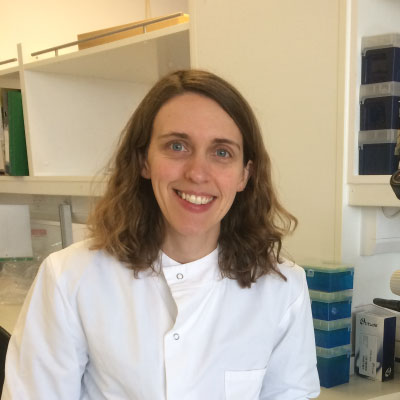Understanding more about the genes involved in bowel cancer at a younger age
Lead Researcher: Dr Claire Palles
Location: University of Birmingham
Grant award: £149,970
Dates: November 2018 – March 2022
Bowel cancer is more common in people over 50, but some people develop the disease at an early age. Dr Claire Palles and their team looked at the genes of younger bowel cancer patients to better understand why this is.
The challenge
We don’t know why some people develop bowel cancer at an early age (under 50 years old). We know that some people inherit a change in one of 15 genes known to increase the risk of bowel cancer. But, for other people it’s not clear what causes the disease to develop early.
The science behind the project
Dr Palles and her research group looked at DNA from younger people with bowel cancer. They checked for any inherited changes in the 15 known bowel cancer risk genes. They also looked for any changes (mutations) in other genes that weren’t previously known to be linked to bowel cancer.
Results
The team found that there’s no difference in how often the 15 known bowel cancer risk genes are mutated between early-onset and late-onset patients. This means those genes weren’t responsible for patients getting bowel cancer earlier.
However, they did identify a new genetic condition caused by mutations in a gene which had not previously been linked to bowel cancer. People with this condition are at higher risk of bowel cancer, and get many bowel polyps (non-cancerous growths) at an early age. As this hasn’t been part of regular genetic testing, it could help explain some cases of early-onset bowel cancer.
- Read the key research paper for more information
Other impact
Dr Palles has published five scientific papers on her research. She also took part in the 2019 Fight Colorectal Cancer meeting on early onset bowel cancer. This brought together experts from around the world to share current research and discuss future priorities.
She’s also collaborated with researchers at the Jiménez Díaz Foundation University Hospital in Madrid to bring data from different centres together into a larger study.
What difference will this project make?
Having a better understanding of the changes that lead to a greater risk of bowel cancer means people with a family history or other risk factors can be screened more effectively. This means that more bowel cancers could be prevented or diagnosed earlier when the disease is easier to treat, potentially saving lives. Learning more about the biology of early onset bowel cancer could also help to develop better treatments for this group of patients.
- Read our blog on understanding more about younger bowel cancer patients
- Find out more about our current research projects
- Donate and help fund our vital research

